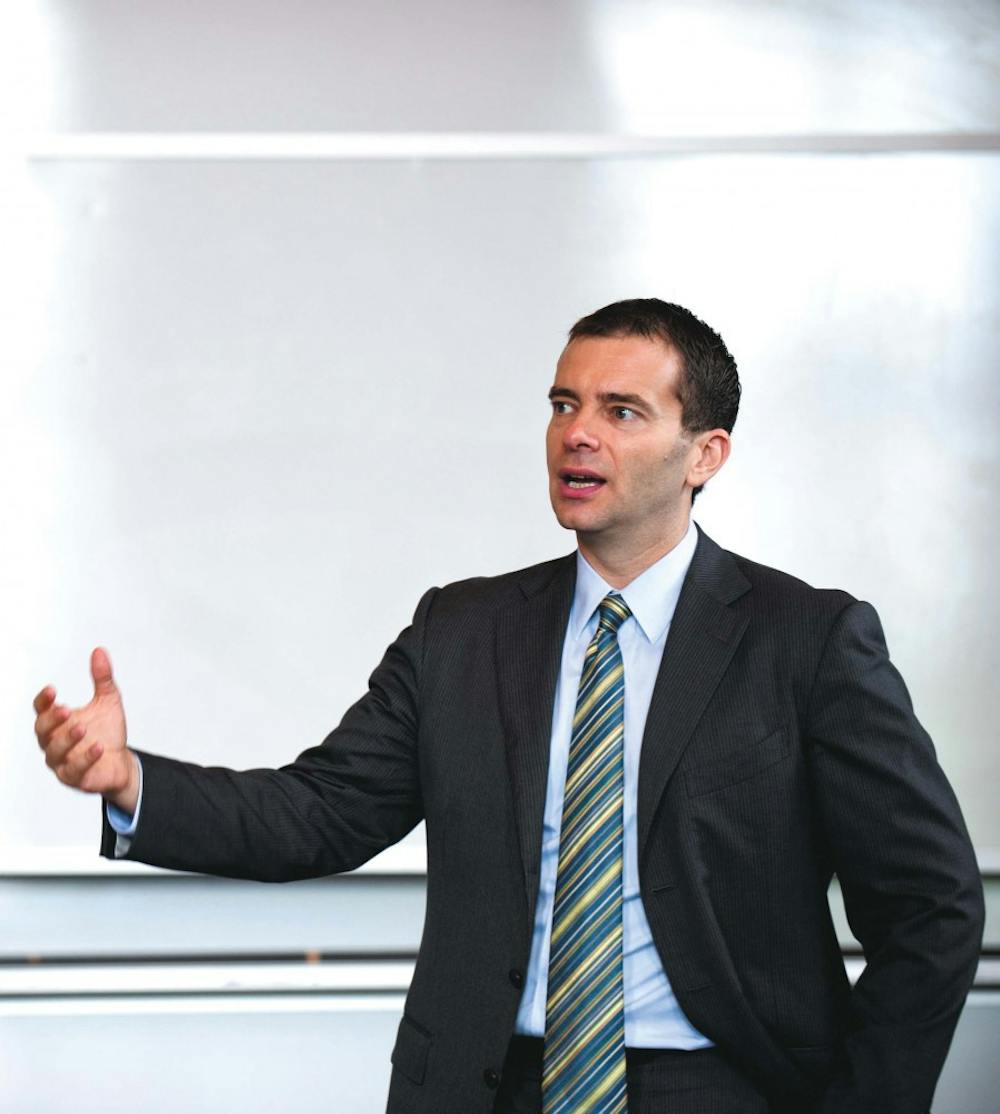On the morning of Dec. 22, 2010, a crowd of roughly 500 national leaders gathered in an auditorium in Washington, D.C. From the front row, Law School professor Tobias Wolff watched as President Barack Obama signed the paper that would repeal the 1993 “Don’t Ask, Don’t Tell” law.
As the ink of his pen dried, the president began to speak one-on-one with members of the crowd, including Wolff. Although the world will probably never know what exactly was said between the two men that caused them to embrace moments later, the emotional moment was immortalized with the snap of a shutter.
Today, the photo hangs in the Wolff’s office at Penn Law.
Since Obama’s early days on the presidential campaign trail in 2007, Wolff has been advising the president on LGBT rights. He served as the LGBT policy chair on the campaign from 2007-08.
Wolff’s early expression of public support for Obama likely distinguished him as a candidate for the position of policy chair.
“Anybody of any consequence in the LGBT political world was supporting Senator Hillary Clinton,” who had a “very well-established relationship with the LGBT community,” he recalled.
Along with his support for Obama, Wolff believes that the Obama team chose him for the position because of his policy and legal expertise.
One of the issues Wolff had studied extensively was “Don’t Ask, Don’t Tell.”
Related
9/27/12: Student leads anti-bullying legislation
9/21/11: Timeline: Don’t Ask, Don’t Tell
9/20/11: ‘Don’t Ask, Don’t Tell’ repeal sparks Penn reaction
“I had been working on that policy for 14 years,” said Wolff, who began teaching full-time at Penn in 2007.
As policy chair, Wolff provided input to the campaign on “the full range” of LGBT policy issues. He was an important spokesman on these issues to voters and the media.
Wolff’s formal role as an adviser ended when the president was elected, but he has been providing counsel on an informal basis in the years since Obama’s inauguration. He was at the White House as recently as this past Friday.
Since Obama was elected, the country has witnessed several major changes on the LGBT policy front.
In addition to the repeal of “Don’t Ask, Don’t Tell,” the U.S. Department of Justice announced in 2011 that it would no longer enforce the 1996 Defense of Marriage Act, which explicitly defined marriage as an institution between a man and a woman. Additionally, in May, Obama became the first sitting U.S. president to publicly declare his support for same-sex marriage.
But the path toward these policy achievements has not always been smooth. Many members of the LGBT community were not satisfied by the progress that the Obama administration initially made on LGBT affairs.
“2009 was not a lot of fun,” Wolff said. “There was a bit of a disconnect, and clearly an understandable disconnect, between the expectations the LGBT community brought upon the president … and the reality of policy-making.”
Since then, though, “it must be said that the Obama administration has been addressing the issues with breathtaking effectiveness, energy and speed (as Washington goes) to in fact get all of these things done,” he added.
One of Wolff’s colleagues at the Law School, William Burke-White, pointed to Wolff as a key player in the changes on LGBT issues that have occurred over the last four years.
“I think he would probably not admit it, but he has been a driving force behind many of the policy shifts that we’ve seen in this administration that have moved us toward equality in the LGBT areas,” he said. “He was really very important to those shifts.”
Wolff cited his personal background as a large motivation for his political involvement. As a gay man, he notes that he is “a second-class citizen under many respects of federal law.”
Wolff described the lack of protections for LGBT individuals and the discrimination they endure as “an intolerable state of affairs.”
“I also think it’s the case that LGBT equality is an important instantiation of a larger set of principles … having to do with equal dignity and equal citizenship,” he said. “It’s important not just for the immediate beneficiaries of LGBT policies, but for the larger society that we live in.”
Although Wolff considers his time in politics to be separate from his career as a law professor, he also recognizes that his experience advising the Obama team have informed his teaching.
Law School professor Stephen Burbank, who personally recruited Wolff to come to Penn, agreed.
“I think that active involvement in a political campaign can provide an enormous amount of insight into a core democratic process,” he said. “He is one of the most influential people in the country in influencing the attitude of the president toward gay and lesbians … His decision to come here was a major plus for Penn.”



